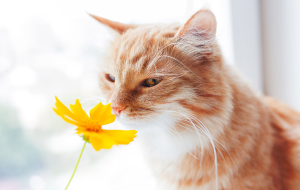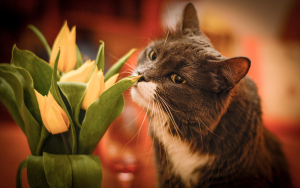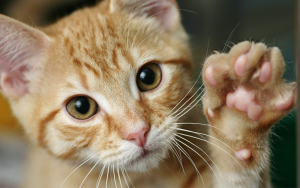Why Does My Cat Follow Me Everywhere? Understanding Your Feline’s Behavior

Have you ever noticed your cat following you from room to room, watching your every move with those curious eyes? This endearing yet puzzling behavior can leave cat owners wondering: why does my cat follow me everywhere? Cats are known for their independent
nature, so this shadowing behavior might seem contradictory. However, it’s entirely normal and stems from a variety of reasons rooted in feline instincts, affection, and needs.
In this article, we’ll delve into the reasons behind this behavior, shedding light on the fascinating world of cats. By understanding your feline’s actions, you can strengthen your bond and ensure their happiness and well-being.
1. Seeking Companionship: A Bond of Trust
Cats are often perceived as solitary creatures, but many are highly social animals. If your cat follows you, it’s likely a sign of affection and trust. When a cat chooses to spend time near you, it’s their way of expressing that they feel safe and secure
in your presence.
How to Strengthen This Bond
- Spend quality time with your cat through play, grooming, or quiet companionship.
- Talk to your cat with a soothing tone to reinforce their trust.
- Provide them with comfortable resting spots near where you spend most of your time.
2. Curiosity: A Cat’s Natural Instinct
Cats are inherently curious animals. They have an innate desire to explore their surroundings and stay informed about what’s happening. By following you, they’re simply satisfying their curiosity. Your movements might signal potential activity, sounds,
or smells that they find intriguing.
Tips to Cater to Their Curiosity
- Rotate their toys to keep them mentally stimulated.
- Provide scratching posts, cat trees, or window perches for environmental enrichment.
- Use interactive toys like laser pointers or treat-dispensing puzzles to engage their minds.
3. Hunger or Basic Needs
Sometimes, the reason your cat follows you is practical—they’re trying to communicate their needs. Whether it’s mealtime, fresh water, or a clean litter box, your cat may use this behavior as a way to get your attention.
How to Respond
- Maintain a consistent feeding schedule to reduce their anxiety about food.
- Ensure their litter box is clean and accessible.
- Check their water supply and replace it frequently to encourage hydration.
4. Feline Affection: They Love You!
Contrary to the aloof stereotype, many cats are deeply affectionate toward their owners. If your cat follows you, it’s often their way of expressing love. You might even notice them rubbing against your legs or purring—a clear indication of their affection.
Ways to Show Love in Return
- Pet your cat in areas they enjoy, such as behind the ears or under the chin.
- Offer treats or toys as positive reinforcement.
- Create a cozy, quiet space for your cat to relax with you.
5. Territorial Behavior: Protecting Their Domain
Cats are territorial animals, and they often view their owners as part of their territory. Following you allows them to keep an eye on their environment and ensure everything is under control.
Supporting Their Territorial Instincts
- Provide your cat with safe spaces they can call their own, such as a specific room or a cat bed.
- Avoid sudden changes in your home environment that could make your cat feel insecure.
- Use pheromone diffusers to promote a sense of calm and stability.
6. Play and Entertainment: A Bored Cat Follows the Fun
Cats need regular mental and physical stimulation. If your cat is bored, they might follow you in search of entertainment. Engaging in playful activities not only satisfies their need for stimulation but also prevents behavioral problems.
Fun Activities to Keep Them Engaged
- Schedule daily play sessions using toys like feather wands or balls.
- Introduce a variety of textures and objects, such as cardboard boxes or paper bags.
- Consider adopting a second cat if your pet seems lonely.
7. Separation Anxiety: A Fear of Being Alone
Some cats develop separation anxiety, causing them to follow their owners everywhere. This behavior can be accompanied by excessive meowing, destructive behavior, or distress when left alone.
Managing Separation Anxiety
- Gradually train your cat to spend time alone by using positive reinforcement.
- Provide enrichment activities, like puzzle feeders or interactive toys, to keep them occupied.
- Consult a veterinarian or animal behaviorist for severe cases.
8. Health Concerns: Monitoring for Changes
Occasionally, a sudden increase in clingy behavior could indicate a health issue. Cats may seek comfort from their owners when they’re feeling unwell. Pay attention to any accompanying signs, such as lethargy, changes in appetite, or unusual vocalizations.
When to Seek Veterinary Help
- If your cat exhibits any abnormal behaviors alongside following you.
- If they show signs of pain, discomfort, or illness.
- For regular health check-ups to rule out underlying conditions.
9. Mimicking Kitten Behavior: Following the Mother Figure
Kittens naturally follow their mothers as they learn survival skills. As a pet owner, you may take on the role of a parental figure in your cat’s eyes. This behavior often continues into adulthood as a sign of dependency and attachment.
Encouraging Independence
- Gradually encourage your cat to explore and play on their own.
- Create stimulating environments where they feel comfortable without needing constant attention.
- Reward independent behaviors with praise or treats.
Conclusion: Embrace the Bond
Your cat following you everywhere is a testament to the strong bond you share. Whether they’re seeking companionship, expressing love, or simply satisfying their curiosity, this behavior reflects their unique personality and trust in you.
Understanding the reasons behind your cat’s actions can deepen your relationship and ensure they lead a happy, healthy life. So, the next time your feline shadow follows you, cherish the moment—it’s their way of saying, “I love you.”
FAQs
1. Is it normal for my cat to follow me everywhere?
Yes, it’s perfectly normal! It often indicates trust, affection, or curiosity.
2. Should I be concerned if my cat suddenly starts following me more than usual?
A sudden change in behavior may warrant a visit to the vet to rule out health issues.
3. How can I make my cat feel more independent?
Provide a stimulating environment with toys, scratching posts, and designated resting spots to encourage self-reliance.







